英语词汇学教程 张唯友 第二章
- 格式:doc
- 大小:25.00 KB
- 文档页数:6
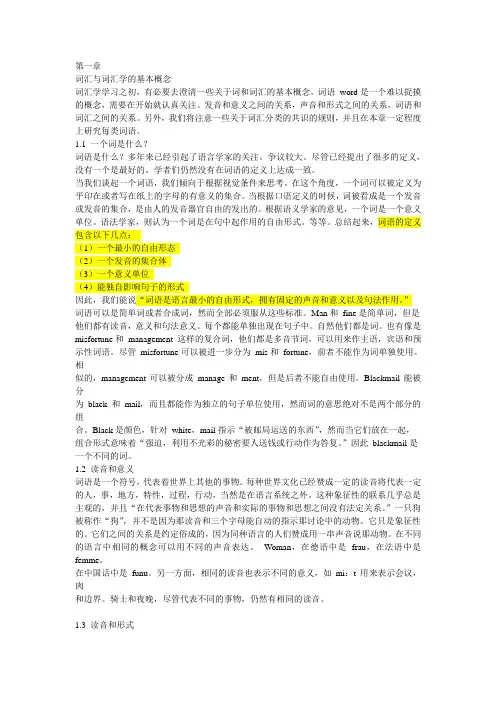
第一章词汇与词汇学的基本概念词汇学学习之初,有必要去澄清一些关于词和词汇的基本概念。
词语word是一个难以捉摸的概念,需要在开始就认真关注。
发音和意义之间的关系,声音和形式之间的关系,词语和词汇之间的关系。
另外,我们将注意一些关于词汇分类的共识的规则,并且在本章一定程度上研究每类词语。
1.1 一个词是什么?词语是什么?多年来已经引起了语言学家的关注。
争议较大。
尽管已经提出了很多的定义,没有一个是最好的。
学者们仍然没有在词语的定义上达成一致。
当我们谈起一个词语,我们倾向于根据视觉条件来思考。
在这个角度,一个词可以被定义为平印在或者写在纸上的字母的有意义的集合。
当根据口语定义的时候,词被看成是一个发音或发音的集合,是由人的发音器官自由的发出的。
根据语义学家的意见,一个词是一个意义单位。
语法学家,则认为一个词是在句中起作用的自由形式。
等等。
总结起来,词语的定义包含以下几点:(1)一个最小的自由形态(2)一个发音的集合体(3)一个意义单位(4)能独自影响句子的形式因此,我们能说“词语是语言最小的自由形式,拥有固定的声音和意义以及句法作用。
”词语可以是简单词或者合成词,然而全部必须服从这些标准。
Man和fine是简单词,但是他们都有读音,意义和句法意义。
每个都能单独出现在句子中。
自然他们都是词。
也有像是misfortune和management 这样的复合词,他们都是多音节词,可以用来作主语,宾语和预示性词语。
尽管misfortune可以被进一步分为mis和fortune,前者不能作为词单独使用。
相似的,management可以被分成manage和ment,但是后者不能自由使用。
Blackmail能被分为black和mail,而且都能作为独立的句子单位使用,然而词的意思绝对不是两个部分的组合。
Black是颜色,针对white,mail指示“被邮局运送的东西”,然而当它们放在一起,组合形式意味着“强迫,利用不光彩的秘密要人送钱或行动作为答复。
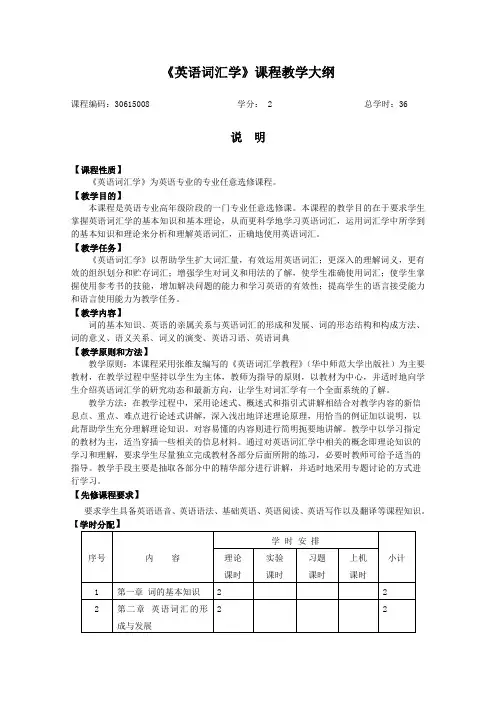
《英语词汇学》课程教学大纲课程编码:30615008 学分: 2 总学时:36说明【课程性质】《英语词汇学》为英语专业的专业任意选修课程。
【教学目的】本课程是英语专业高年级阶段的一门专业任意选修课。
本课程的教学目的在于要求学生掌握英语词汇学的基本知识和基本理论,从而更科学地学习英语词汇,运用词汇学中所学到的基本知识和理论来分析和理解英语词汇,正确地使用英语词汇。
【教学任务】《英语词汇学》以帮助学生扩大词汇量,有效运用英语词汇;更深入的理解词义,更有效的组织划分和贮存词汇;增强学生对词义和用法的了解,使学生准确使用词汇;使学生掌握使用参考书的技能,增加解决问题的能力和学习英语的有效性;提高学生的语言接受能力和语言使用能力为教学任务。
【教学内容】词的基本知识、英语的亲属关系与英语词汇的形成和发展、词的形态结构和构成方法、词的意义、语义关系、词义的演变、英语习语、英语词典【教学原则和方法】教学原则:本课程采用张维友编写的《英语词汇学教程》(华中师范大学出版社)为主要教材,在教学过程中坚持以学生为主体,教师为指导的原则,以教材为中心,并适时地向学生介绍英语词汇学的研究动态和最新方向,让学生对词汇学有一个全面系统的了解。
教学方法:在教学过程中,采用论述式、概述式和指引式讲解相结合对教学内容的新信息点、重点、难点进行论述式讲解,深入浅出地详述理论原理,用恰当的例证加以说明,以此帮助学生充分理解理论知识。
对容易懂的内容则进行简明扼要地讲解。
教学中以学习指定的教材为主,适当穿插一些相关的信息材料。
通过对英语词汇学中相关的概念即理论知识的学习和理解,要求学生尽量独立完成教材各部分后面所附的练习,必要时教师可给予适当的指导。
教学手段主要是抽取各部分中的精华部分进行讲解,并适时地采用专题讨论的方式进行学习。
【先修课程要求】要求学生具备英语语音、英语语法、基础英语、英语阅读、英语写作以及翻译等课程知识。
教材:张维友《英语词汇学教程》华中师范大学出版社,2004年。
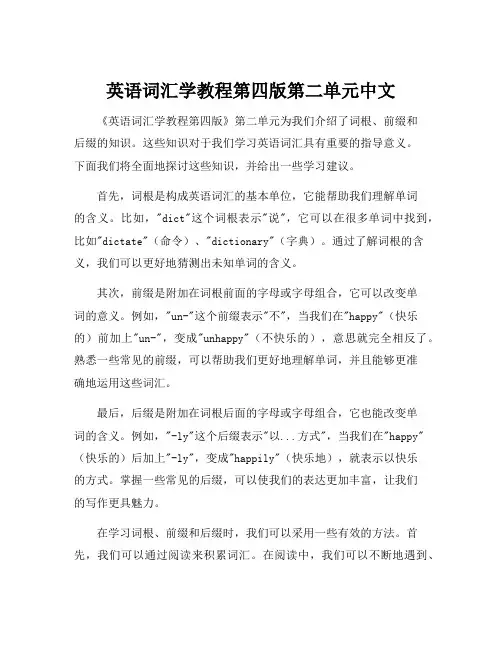
英语词汇学教程第四版第二单元中文《英语词汇学教程第四版》第二单元为我们介绍了词根、前缀和后缀的知识。
这些知识对于我们学习英语词汇具有重要的指导意义。
下面我们将全面地探讨这些知识,并给出一些学习建议。
首先,词根是构成英语词汇的基本单位,它能帮助我们理解单词的含义。
比如,"dict"这个词根表示"说",它可以在很多单词中找到,比如"dictate"(命令)、"dictionary"(字典)。
通过了解词根的含义,我们可以更好地猜测出未知单词的含义。
其次,前缀是附加在词根前面的字母或字母组合,它可以改变单词的意义。
例如,"un-"这个前缀表示"不",当我们在"happy"(快乐的)前加上"un-",变成"unhappy"(不快乐的),意思就完全相反了。
熟悉一些常见的前缀,可以帮助我们更好地理解单词,并且能够更准确地运用这些词汇。
最后,后缀是附加在词根后面的字母或字母组合,它也能改变单词的含义。
例如,"-ly"这个后缀表示"以...方式",当我们在"happy"(快乐的)后加上"-ly",变成"happily"(快乐地),就表示以快乐的方式。
掌握一些常见的后缀,可以使我们的表达更加丰富,让我们的写作更具魅力。
在学习词根、前缀和后缀时,我们可以采用一些有效的方法。
首先,我们可以通过阅读来积累词汇。
在阅读中,我们可以不断地遇到、学习和记忆新的词根、前缀和后缀。
同时,我们也可以结合看电影、听音乐等娱乐活动,通过上下文来理解和记忆这些词汇。
其次,我们可以利用词根、前缀和后缀来记忆单词。
比如,当我们学习新的单词时,可以将其和已知的词根、前缀和后缀进行联系。
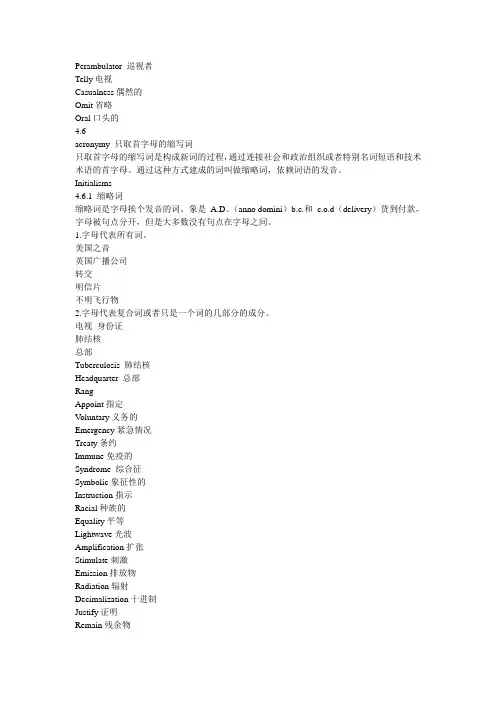
Perambulator 巡视者Telly电视Casualness偶然的Omit省略Oral口头的4.6acronymy 只取首字母的缩写词只取首字母的缩写词是构成新词的过程,通过连接社会和政治组织或者特别名词短语和技术术语的首字母。
通过这种方式建成的词叫做缩略词,依赖词语的发音。
Initialisms4.6.1 缩略词缩略词是字母挨个发音的词。
象是A.D。
(anno domini)b.c.和c.o.d(delivery)货到付款,字母被句点分开,但是大多数没有句点在字母之间。
1.字母代表所有词。
美国之音英国广播公司转交明信片不明飞行物2.字母代表复合词或者只是一个词的几部分的成分。
电视身份证肺结核总部Tuberculosis 肺结核Headquarter 总部RangAppoint指定V oluntary义务的Emergency紧急情况Treaty条约Immune免疫的Syndrome 综合征Symbolic象征性的Instruction指示Racial种族的Equality平等Lightwave光波Amplification扩张Stimulate刺激Emission排放物Radiation辐射Decimalization十进制Justify证明Remain残余物Contemporary同代的人Constituent成分Period句点4.6.2Acronyms首字母缩写词首字母缩写词是从首字母构成,但是发音是正常词,例如“雷达”(无线电探测和响铃)“义务女工”“艾滋病”(免疫匮乏综合征)“basic”(初学者多功能象征性指示码)“种族平等进程”“通过刺激辐射物排放导致的光波扩张”(激光)“英语教学”一些首字母缩写词是由第一词的首字母加上第二个整词构成,例如“核弹”“防御提示”“公务员”“十进制的日子”“胜利日”两种首字母缩写词在第二次世界大战以来已经变得非常流行并且因此极具活力。
这在etcrowley的缩写词字典中搜集的那样词的数量来证明。
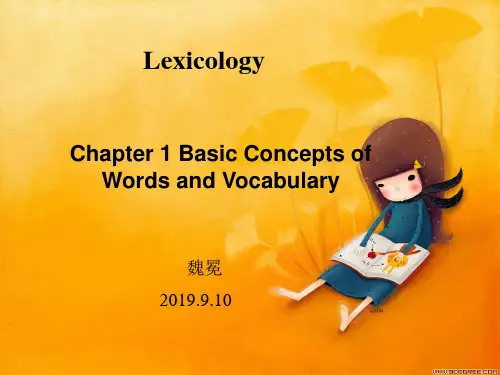
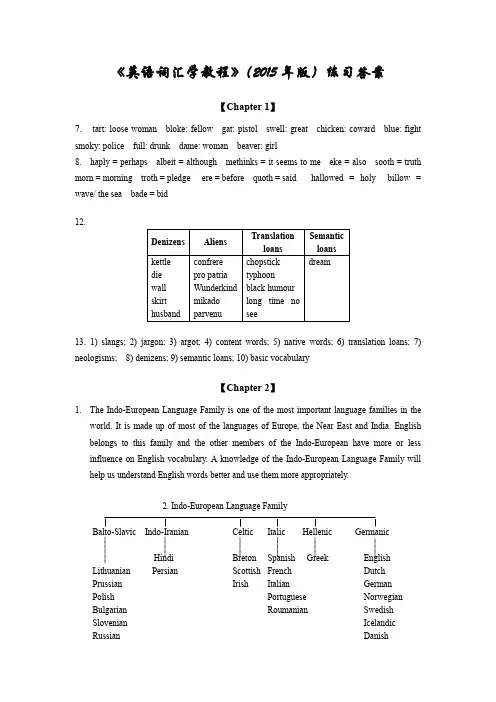
《英语词汇学教程》(2015年版)练习答案【Chapter 1】7. tart: loose woman bloke: fellow gat: pistol swell: great chicken: coward blue: fight smoky: police full: drunk dame: woman beaver: girl8. haply = perhaps albeit = although methinks = it seems to me eke = also sooth = truth morn = morning troth = pledge ere = before quoth = said hallowed = holy billow = wave/ the sea bade = bid12.Denizens Aliens Translation loansSemantic loanskettle die wall skirt husbandconfrere pro patria Wunderkind mikado parvenuchopstick typhoonblack humour long time no seedream13. 1) slangs; 2) jargon; 3) argot; 4) content words; 5) native words; 6) translation loans; 7) neologisms; 8) denizens; 9) semantic loans; 10) basic vocabulary【Chapter 2】1. The Indo-European Language Family is one of the most important language families in theworld. It is made up of most of the languages of Europe, the Near East and India. English belongs to this family and the other members of the Indo-European have more or less influence on English vocabulary. A knowledge of the Indo-European Language Family will help us understand English words better and use them more appropriately.2. Indo-European Language FamilyBalto-Slavic Indo-IranianCeltic Italic HellenicGermanic HindiBreton Spanish Greek English Lithuanian Persian Scottish French Dutch Prussian Irish Italian German PolishPortuguese Norwegian Bulgarian Roumanian Swedish Slovenian IcelandicRussianDanish6. When in the course of human events, it becomes necessary for one people to dissolve the political bonds which have connected them with another, and to assume among the powers of the earth separate and equal station to which the laws of nature and of nature's God entitle them, a decent respect to the opinions of mankind requires that they should declare the causes which impel them to the separation.Most of the content words are either of Greek or Latin origin. What are left are mostly functional words. This shows that Greek and Latin play a very important part in the English vocabulary.8. eventful [Latin + English] hydroplane [Greek + Latin]falsehood [ Latin + English] pacifist [Latin + Greek]saxophone [German + Greek] heirloom [ French + English]joss house [ Portuguese + English] television [Greek + Latin]9. amateur (late) finacé (late) empire (early)peace (E) courage (E) garage (L)judgement (E) chair (E) chaise (L)grace (E) servant (E) routine (L)jealous (E) savaté (L) genre (L)gender (E) début (L) morale (L)state (E) chez (L) ballet (L)11. allegro, f 轻快andante, j 行板diminuendo, g 渐弱largo, d 缓慢pianoforte, a 轻转慢alto, i 女低音crescendo, b 渐强forte, e 强piano, h 轻soprano, c 女高音12. cherub (Hebrew) snorkel (G)coolie (Hindi) tulip (Turk)lasso (Sp) wok (Ch)shampoo (Indian) chocolate (Mex)tepee (Am Ind) jubilee (Gr)kibitz (G) Sabbath (Heb)chipmunk (Am Ind) tamale (Mex)cotton (Arab) voodoo (Afr)loot (Hindi) sauerbraten (G)13. a. alligator b. lococ. rodeod. bonanzae. igloof. blitzkriegg. wigwam h. canoei. hurricane j. boomerangk. ponchos【Chapter 3】1. a. morpheme b. allomorphc. bound morphemed. free morphemee. affixf. inflectional affixg. derivational affix h. rooti. stem j. base6. individualistic undesirablesindividualist [stem, base] undesirable [stem, base]individual [stem, base] desirable [stem, base]dividual [stem, base] desire [root, stem, base] dividu [root, stem, base]7.free morpheme = free rootmorpheme bound rootbound morpheme inflectional affixaffix prefixderivational affixsuffix【Chapter 4】Affixation5. non-smoker incapable impracticaldisobey insecurity irrelevantimmature inability/disability unofficiallyunwillingness illegal disagreementillogical disloyal inconvenientnon-athletic6. harden horrify modernizememorize falsify apologizedeepen glorify sterilizelengthen intensify beautifyfatten sympathizea. apologizedb. beautifyc. lengtheningd. sympathizede. fatteningf. falsifyg. memorizing h. Sterilize7. a. employee b. politician c. participantd. waitresse. conductorf. teacherg. pianist h. examinee/examiner8. trans- = across: transcontinental, trans-Siberianmono- = one: monorail, monoculturesuper- = over, above: superstructure, supernaturalauto- = self: autobiography, automobilesub- = below: subdivide, subsectionmal- = bad, badly: malpractice, malnutritioninter-= between: international, interdependentmini- = little, small: mini-library, miniskirtpre- = before: prehistorical, preelectionex- = former:ex-president, ex-convictCompounding2.heartbeat [S + V] brainwashing [V + O]movie-goer [V + Adverbial (place)] baking powder [ V + Adverbial (instrument)] far-reaching [V + Adverbial] dog-tired [noun-adverbial + adj.]lion-hearted [noun-adverbial + adj.] love-sick [noun-adverbial + adj.]boyfriend [S + complement] peace-loving [V +O]snap decision [V + O] easy chair [ S+ C]on-coming [V +adv] tax-free [noun-adverbial + adj.]light-blue [adj + adj] goings-on [V +adv]3. well-bred / well-behaved culture-bound / homeboundneedle-work / homework praiseworthy / trustworthybar-woman / sportswoman nation-wide / college-wideclear-minded / strong-minded military-style / western-styleself-control / self-respect budget-related / politics-relatedwater-proof / fire-proof once-fashionable / once-powerfulnews-film / news-letter mock-attack / mock-sadnesssister-in-law / father-in-law home-baked / home-producedhalf-way / half-done ever-lasting / ever-greenage-conscious / status-conscious campus-based / market-basedConversion7. a. stomach [n → v]b. room [n → v]c. wolf [n → v]d. come / go [v → n]e. familiar [a → n]f. innocent [a → n]g. flat [a → v]h. ah / ouch [int → v]i. warm [a → n]j. has-been / might-have-been [finite v → n]k. Hamlet [proper n → v]l. buy [v → n]m. smooth [a → v]Blendingmotel (mo tor + ho tel) 汽车旅馆humint (hum an + int elligence) 人工情报,谍报advertisetics (advertise ment + statis tics) 广告统计学psywarrior (psy chological warrior) 心理战战士hoverport (hover craft + port) 气垫船港口chunnel (ch annel + t unnel) 水底火车隧道hi-fi (hi gh + fi delity) 高保真cinemactress (cinem a + actress) 电影女演员Clippingcopter (heli copter): front clipping dorm (dorm itory): back clippinglab (lab oratory) :front clipping prefab (pref abricated house): phrase clipping gas (gas oline): front clipping prof (prof essor): back clippingscope (tele scope): front clipping champ (champ ion): back clippingsarge (serge ant): back clipping mike (mic rophone): back clippingad (ad vertisement): back clipping tec (de tec tive): front and back clippingAcronymy1. kg = k ilo g ram ft = f oo t cf = c on f ercm = c enti m eter $ = dollaribid = ibid em etc. = et c eteraVIP = v ery i mportant p ersonOPEC = O rganization of P etroleum E xporting C ountries TOEFL = t esting o f E nglish as a f oreign l anguage2. a. SALTb. radarc. AIDSd. BASICe. Laserf. WHOg. sonarh. G-manBackformation2. lase (laser)escalate (escalator)babysit (babysitter)peeve (peevish)orate (orator)commute (commuter)Commonization of Proper Names3. a. tantalize—Tantalusb. Argus-eyed—Argusc. narcissism—Narcissusd. sabotage—sabotse. martinet—Martinetf. yahoo—Yahoog. Shylock—Shylockh. hoovering—Hooveri. utopia—Utopiaj. Uncle Tomism—Uncle Tom【Chapter 5】6. apes—b birds—a cattle—mcricket—n doves—c foxes—jgeese—k sheep—f wolves—gmonkeys—e pigs—l hyenas—hturkeys—d swans—i9. a. A scientist working in a project to develop industrial uses for nuclear power might have all the positive associations with “atomic”, such as “benefit, energy”, etc.b. A Japanese resident of Hiroshima, victim of the atomic explosion at the end of World War II, might have all the negative associations with “atomic”, such as “suffering, killing, death, horror", etc.c. To a student of nuclear physics, “atomic” might be associated with “mystery, science, knowledge”, etc.10. talkative: implying a fondness for talking frequently and at length (neutral)articulate: expressing oneself easily and clearly (positive)gossip: indulging in idle talk or rumours about others (negative)rambling: talking aimlessly without connection of ideas (negative)fluent: speaking easily, smoothly, and expressively (positive)mouthy: overtly talkative, especially in a rude way (negative)11.No Appreciative Neutral Pejorative1 particular fastidious / fussy2 critical fault-finding / picky3 style/vogue fad4 artful cunning / sly5 unstable fickle / capricious6 developing underdeveloped / backward7 encourage/ promote instigate8 group clique / gang14. bull [-HUMAN +MALE +ADULT +BOVINE]cow [-HUMAN -MALE +ADULT +BOVINE]calf [-HUMAN OMALE -ADULT +BOVINE]rooster [-HUMAN +MALE +ADULT +GALLINE]hen [-HUMAN -MALE +ADULT +GALLINE]chicken [-HUMAN OMALE -ADULT +GALLINE]-HUMANbull cow calf +BOVINErooster hen chicken +GALLINE+MALE -MALE -ADULT【Chapter 6】Polysemy4. The word board first denoting "a table" has later acquired two very divergent senses. Each of them has given rise to another sense from which the original notion has disappeared. The process can be shown as follows:Homonymy4. 1) Make both ends meat is a parody of make both ends meet which means “have enoughmoney for one’s needs”. Here the butcher cleverly uses the pair of homonyms meat and meet to make a pun. It makes a proper answer to the lady’s question. (1) Butchers cannot make both ends meat (make whole sausages with all meat) because they cannot make both ends meet (If they made sausages with all meat, which is more costly, they would not earn enough money to survive.) (2) Don’t complain. All the butchers do the same. I am not the only one who is making sausages with bread.2) Swallow is a bird which is seen in summer. But by one swallow we see, we cannotdeduce that it is already summer time. Swallow can also mean a mouthful of wine. On a cold winter day, if one has a swallow of wine, one may feel warm.3) Arms has two meanings: weapons; the human upper limbs. Since “a cannon ball took offhis legs”, the soldier was not able to fight on, so he “laid down his arms”, which means “surrender”. It can also mean he laid down his upper limbs.Synonymy3. avaricious: greedy courteously: politelyemancipate: set free customary: usualwidth: breadth adversary: opponent gullible: deceived remainder: residueinnocent: sinless obstacle: obstruction vexation: annoyance5. a. identifiable b. safetyc. motivatesd. delicatee. surroundingsf. artificialg. prestige h. perspirei. accomplishment j. silentk. impressive l. evaporate6. run move spinturn whirl roll7. a. stead b. gee-gee c. riped. maturee. effectivef. efficientg. fatigued, children h. tired, kids i. declinedj. refused k. rancid l. addledm. Penalties n. fines o. rebukedp. accusedAntonymy5. a. similar/same b. safec. sharp/ smartd. sende. stingy/ selfish h. simplef. significant/sensible i. sureg. skeptical/ suspicious l. smoothj. slipshod/ slovenly/ sloppy k. sleepiness/ sleep / slumberm. subjective n. sob/ scowl6. a. old-fashioned b. completelyc. moistured. speciale. essentialf. similarityg. innocent h. rigidi. loosen j. clarityk. deserted l. fruitfulm. peremptory n. depressedo. indifferent7. a. feed—starve, cold-fever b. wisdom—folliesc. haste—leisured. penny—pound, wise—foolishe. speech—silencef. absence—presenceg. admonish—praise i. wise men—foolsh. young—old private—public saint—devilj. mind—body k. foul—fairl. danger—security m. deliberate--promptn. children—parents o. bully—cowardp. head—tail8. right—wrong single—returndry—sweet hard—easystrong—faint rough—calmlight—dark cold—warmhigh—low/deepHyponymy3.furniture: desk, chair, table, bedmatter: liquid, gas, solidmeat: pork, beef, muttongo: run, fly, walk4.profession workplacesurgeon: clinic, hospitalplumber: house, buildinglawyer: office, law courtsmechanic: garagephotographer: studioforeman: worksite, factory5.6. In Sentence 1), got, furniture, recently are superordinates because they are general and convey a very vague idea whereas in Sentence 2), the three words are replaced respectively by bought, cupboard, three days ago, which are subordinates, conveying a definite and clear idea. So Sentence 2) is better than Sentence 1.In Sentence 3), it is said, magnificent building, destroyed, yesterday are superordinate terms, which are comparatively much more general than the news says, Royal Hotel, burnt down, last night respectively in 4), which can be described as subordinates. Since 4) is clearer than 3) in meaning, it is better.Semantic field3. Group 1 is synonymously semantic field and Group 2 is semantic filed. The difference lies: In 1 the words are synonyms, none of them covers the meaning of another, and they differ only in style and emotive values. In 2 the words are not synonyms, but each refers to a specific type of horse. Horse is a cover term or superordinate, and others are subordinates. These terms have no difference in style or affective meaning.【Chapter 7】4. 1) extension 2) extension3) narrowing 4) degradation5) elevation 6) narrowing7) extension 8) extension9) narrowing 10) narrowing11) elevation 12) degradation13) degradation 14) degradation5. a. associated transferb. abstract to concretec. concrete to abstractd. abstract to concretee. abstract to concretef. abstract to concreteg. associated transferh. associated transferi. synesthesia (transfer of sensation from sight to hearing)j. synesthesia (transfer of sensation)6. a. objective b. subjective, objectivec. objectived. subjectivee. subjectivef. subjectiveg. subjective h. subjective, objective7. a. die b. graveyardc. bedlam疯人院d. old peoplee. strikef. Policemang. stupid pupil h. poor peoplei. toilet j. fat personk. unemployed mother【Chapter 8】2. 1) a. to repairb. measurement and determination of one’s positionc. predicamentd. injection2) a. a single complete dividing part (of a rocket)b. the theatre or acting as a professionc. a particular point or period in a process of developmentd. to plan, arrange and carry out3) a. interchange and discussion of ideas, esp. for mutual understanding orharmonyb. conversationc. a written conversation (of a play, etc.)3. a. synonymyb. explanation/ definitionc. exemplificationd. relevant detailse. relevant detailsf. relevant details4. a. stop people drinkingstop drinking by themselvesb. a stone house which is biga house built of big stonesc. a picture possessed by Bettya photograph of Bettyd. aunts who are visitingpaying a visit to auntse. take Jane as his wifepreside over Jane’s weddingf. a weapon that can fly over long distance and that it explodes when it h its the thing itaims atan object that is thrown at somebody in order to hurt him【Chapter 9】6. a—2) b—9) c—3)d—6) e—1) f—8)g—5) h—4) i—7)j—10)7. a. stand out againstb. approve ofc. get … over withd. looking intoe. come up withf. comply withg. cashed in onh. go withouti. to profit by / fromj. dut down …to8. a cool cat = a really calm personblow one's stack = lose control over oneselffly off the handle = become excessively angrywhat's more = furthermoreget away with = commit an illegitimate act without penaltyof course = naturallyget on = get oldpepper and salt = grey (hair)make up for = compensate forlost time = time wastedtake it easy = relax, not worryget up = rise from bedturn in = go into bedtake care of = manage or look afterlike a breeze = without effort or easilytime off = time for restget it made = be successfulthis is it = be in a position or place, or have possession of an object beyond which more of the same is unnecessarySam is really a calm person. He never loses control of himself and hardly ever becomes too angry. Furthermore, he knows how to manage his business financially by using a few tricks… Needless to say, he, too, is getting older. His hair is beginning to turn grey, but he knows how to compensate for wasted time by relaxing. He rises early, exercises, and goes to bed early. He manages his frankfurter dispensary without visible effort, until it is someone else's turn to work there. Sam is successful, he has reached his life's goal.9. a. “Well, it's the old story of the stitch in time,” he said.A stitch in time saves nine.b. Fleur's head was lost in the tool-box, but her voice was heard saying: “Too many cooks,better let me.”Too many cooks spoil the broth.c. But not many other people held that view discerning his finger still very large in everypie — so much so that there often seemed less pie than finger.have a finger in the pied. I’m thinking of putting up a “Silence is golden” placard in his office. Nobody can hearthemselves think.Speech is silver, silence is golden.e. They four had one likeness: their appearance and their work was as it were a wheel inthe middle of a wheel.wheel within wheelsf. He quotes them extensively nevertheless, together with other equally suspectevidence, because otherwise he would have no straw with which to make his bricks.make bricks without straw10. wind and weather wheeling and dealingwaifs and strays town and gowntop and tail time after timerules and regulations rise and fallrags and tatters puff and blowpick and shovel peace and quietover and above one and onlyoff and on neck and neckshoulder to shoulder moan and groanmilk and water man and beast11. a. 好奇伤身。
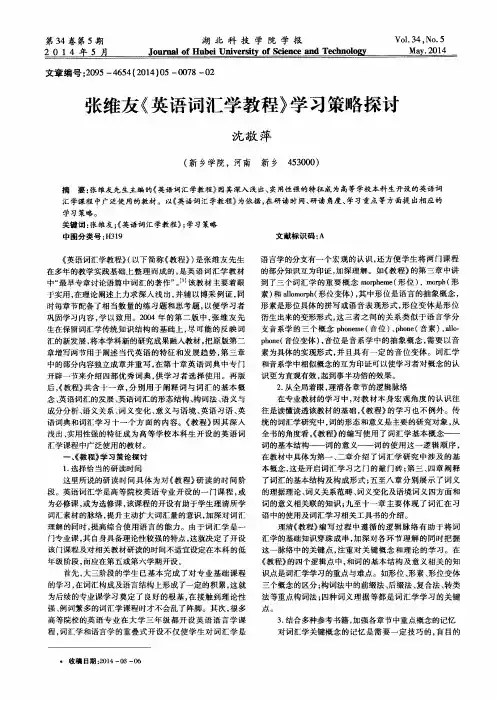
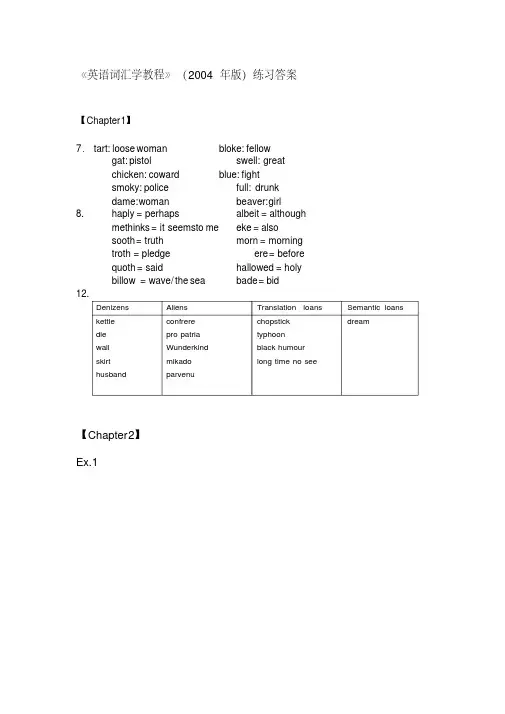
《英语词汇学教程》(2004年版)练习答案【Chapter1】7.tart:loose woman bloke:fellowgat:pistol swell:greatchicken:coward blue:fightsmoky:police full:drunkdame:woman beaver:girl8.haply=perhaps albeit=althoughmethinks=it seemsto me eke=alsosooth=truth morn=morningtroth=pledge ere=beforequoth=said hallowed=holybillow=wave/the sea bade=bid12.Denizens Aliens Translation loans Semantic loanskettle diewall skirt husband confrerepro patriaWunderkindmikadoparvenuchopsticktyphoonblack humourlong time no seedream【Chapter2】Ex.1The Indo-European Language Family is one of the most important language families in the world.It is made up of most of the languages of Europe,the Near East and India.English belongs to this family and the other members of the Indo-European have more or less influence on English vocabulary.A knowledge of the Indo-European Language Family will help us understand English words better and use them more appropriately.2.Indo-EuropeanLanguageFamilyBalto-Slavic Indo-Iranian Celtic Italian Hellenic GermanicRoumanian Hindi Breton Spanish Greek EnglishLithuanian Persian Scottish French SwedishPrussian Irish Italian GermanPolish Portuguese NorweigianSlavenian IcelandicRussian DanishBulgarian Dutch6.When in the course of human events,it becomes necessary for one people to dissolve the political bonds which have connected them with another,and to assume among the powers of the earth separateand equal station to which the laws of nature and of nature's God entitle them,a decent respect to the opinions of mankind requires that they should declare the causes which impel them to the separation.Most of the content words are either of Greek or Latin origin.What are left are mostly functional words.This shows that Greek and Latin play a very important part in the English vocabulary.8.eventful[Latin+English]hydroplane[Greek+Latin]falsehood[Latin+English]pacifist[Latin+Greek]saxophone[German+Greek]heirloom[French+English]joss house[Portuguese+English]television[Greek+Latin]9.amateur(late)finacé(late)empire(early)peace(E)courage(E)garage(L)judgement(E)chair(E)chaise(L)grace(E)servant(E)routine(L) jealous(E)savaté(L)genre(L) gender(E)début(L)morale(L) state(E)chez(L)ballet(L) 11.allegro,f轻快andante,j行板diminuendo,g渐弱largo,d缓慢pianoforte,a轻转慢alto,i女低音crescendo,b渐强forte,e强piano,h轻soprano,c女高音12.cherub(Hebrew)snorkel(G)coolie(Hindi)tulip(Turk)lasso(Sp)wok(Ch)shampoo(Indian)chocolate(Mex)tepee(Am Ind)jubilee(Gr)。
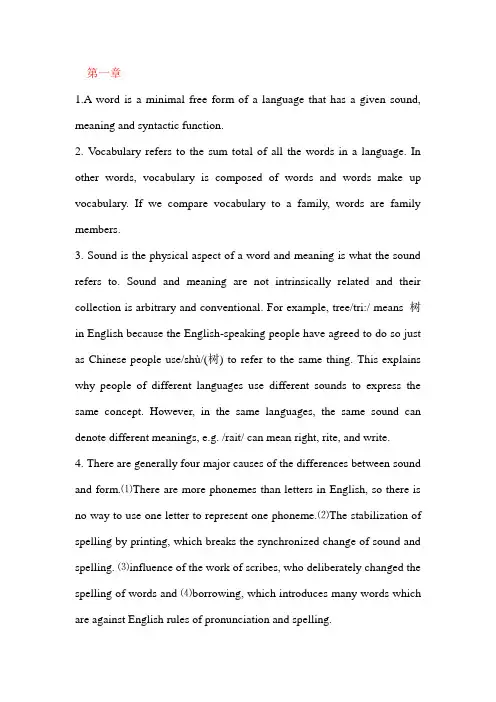
第一章1.A word is a minimal free form of a language that has a given sound, meaning and syntactic function.2. V ocabulary refers to the sum total of all the words in a language. In other words, vocabulary is composed of words and words make up vocabulary. If we compare vocabulary to a family, words are family members.3. Sound is the physical aspect of a word and meaning is what the sound refers to. Sound and meaning are not intrinsically related and their collection is arbitrary and conventional. For example, tree/tri:/ means 树in English because the English-speaking people have agreed to do so just as Chinese people use/shù/(树) to refer to the same thing. This explains why people of different languages use different sounds to express the same concept. However, in the same languages, the same sound can denote different meanings, e.g. /rait/ can mean right, rite, and write.4. There are generally four major causes of the differences between sound and form.⑴There are more phonemes than letters in English, so there is no way to use one letter to represent one phoneme.⑵The stabilization of spelling by printing, which breaks the synchronized change of sound and spelling. ⑶influence of the work of scribes, who deliberately changed the spelling of words and ⑷borrowing, which introduces many words which are against English rules of pronunciation and spelling.5 .Early scribes changed the spelling of many words while copying things for others because the original spelling forms in cursive writing were difficult for people to recognize, such as sum, cum, wuman, munk and so on. Later, the letter u with vertical lines was replaced with o, resulting in the current spelling forms like some, come, woman, monk. The changed spelling forms are more distinguishable to readers.6. Words of the basic word stock form the common core of the English language. They are the words essential to native speakers’ daily communication. Such words are characterized by all national character, stability, polysemy, productivity and collocability.7. a. loose woman b. fellow c. pistol d. great e. cowardf. fightg. policeh. drunki. womanj. girl8. haply = perhaps albeit= althoughmethinks = it seems to me eke= alsosmooth= truth morn= morningtroth= pledge ere= beforequoth = said hallowed= holybillow= wave/ the sea bade= bid9. Neologisms refer to newly-coined words or old words with new meanings. For example, euro(欧元),e-book(电子书),SARS(非典), netizen (网民), are newly-coined words. Words like mouse(鼠标),web(网络),space shuttle(航天飞机) etc. are old words which have acquired new meanings.10. By notion, words fall into content words and functional words. Content words include nouns, verbs, adjectives, adverds and numerals, which have clear notions; whereas functional words are void of notions but are mainly used to connect content words into sentences. Content words are numerous and changing all the time, while functional words are small in number and stable. But functional words have much higher frequency in use than content words.11. Native words form a small portion of the English vocabulary, but they make up the mainstream of the basic word-stock which belongs to the common core of the English language. Compared with most loan-words, native words are mostly essential to native speakers’ daily communication and enjoy a much higher frequency in actual use.12. Denizens Aliens Translation loans Semantic loanskettle confrere chopsticks dreamdie pro patria black humour skirt parvenu long time no see wall Wunderkind typhoon husband Mikado。
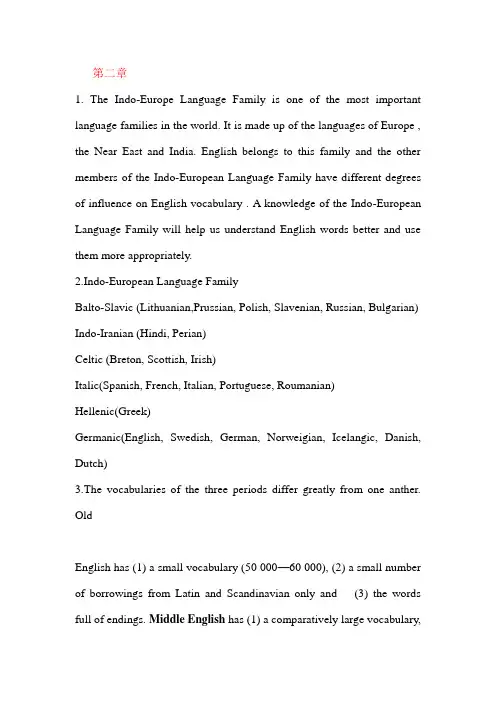
第二章1. The Indo-Europe Language Family is one of the most important language families in the world. It is made up of the languages of Europe , the Near East and India. English belongs to this family and the other members of the Indo-European Language Family have different degrees of influence on English vocabulary . A knowledge of the Indo-European Language Family will help us understand English words better and use them more appropriately.2.Indo-European Language FamilyBalto-Slavic (Lithuanian,Prussian, Polish, Slavenian, Russian, Bulgarian) Indo-Iranian (Hindi, Perian)Celtic (Breton, Scottish, Irish)Italic(Spanish, French, Italian, Portuguese, Roumanian)Hellenic(Greek)Germanic(English, Swedish, German, Norweigian, Icelangic, Danish, Dutch)3.The vocabularies of the three periods differ greatly from one anther. OldEnglish has (1) a small vocabulary (50 000—60 000), (2) a small number of borrowings from Latin and Scandinavian only and (3) the words full of endings. Middle English has (1) a comparatively large vocabulary,(2) a tremendous number of foreign words from French and Latin and (3) word endings leveled. Modern English has (1) a huge and heterogeneous vocabulary, (2) tremendous borrowings and (3) words with lost endings.Yes, we can divide the developments in other ways, for example, Old English period can be called Anglo-Saxon period. And Middle English might start from 1066, the time of Norman Conquest. But in doing so, the logical continuation of thee three phases of the original division is lost.4. It is receptivity and adaptability of the English language that make it possible for English to borrow heavily from other major languages of the world, so that the English vocabulary eventually has become heterogeneous.5. The popularity of English lies in the fact that English is ready to borrow from other languages and to adapt itself to new situations and new developments, that it has accepted elements from all other major languages and that it has simple reflection and a relatively fixed word order. All these make the language comparatively easy to learn and to use.6. course human events necessary peopledissolve political connected assume powersseparate equal station nature entitle decentrespect opinions requires declare causes impelseparationFrom the words picked out, we can see that most of the contentwords are either of Greek or Latin origin. What we left are mostly functional words. This shows that Greek and Latin play a very important part in the English vocabulary.7. Latin borrowing can be divided into four phase: (1)Pre-Anglo-Saxon period,(2)Old English period, (3) middle English period and(4) Modern English period. Borrowings in the first period are mainly common words such as wall, wine, kettle and so on; words borrowed in the second period are mainly religious terms such as candle, nun, church; the third period saw word borrowed often via French such as frustrate, history, infancy and so on and in the forth period Words borrowed from Latin are usually abstract formal terms like status ,nucleus , minimum. 8. eventful [Latin + English] hydroplane [Greek +Latin ]Falsehood [Latin +English ] pacifist [Latin +Greek ]Saxophone [German +Greek ] heirloom [French +English ]Joss house [Portuguese +English ] television [Greek + Latin ]9. amateur (late) finace (late)Empire (late) peace (early)Courage (early) garage (late)Judgement (early) chair (early)Chaise (late) grace (early)Servant (early) routine (late)Jealous (early) savate (late)Genre (late) gender (early)Debut (late) morale (late)State (early) chez (late)Ballet (late)10. Jespersen’s comment reveals the importance of Scandinavian words in English. Just as people cannot live without bread and eggs, so English language cannot operate properly without Scandinavian words.11. allegro f . 轻快Alto i. 女低音Andante j 行板Crescendo b.渐强Diminuendo g. 渐弱Forte e.强Largo d.缓慢Piano h. 轻Pianoforte a.轻转慢Soprano c.女高音12. cherub(Hebrew)chipmunk(American Indian )Chocolate(Mexican ) coolie(Hindi)Cotton (Arabic) jubilee (Greek)Lasso (Spanish) loot (Hindi)Sabbath (Hebrew) shampoo (Hindi)Snorkel (German) tamale (Mexican)Tepee (American) tulip (Turkish)V oodoo (African) kibitz (German)Wok (Chinese) sauerbraten (German)13. a.alligator b.lococ.rodeod..bonanzae.igloof.blitzkriegg.wigwam h.canoei.hurricane j.boomerangk.poncho14. the characteristics of the contemporary vocabulary can be summarized as follows: (1) the vocabulary is huge in size and heterogeneous; (2) it has tremendous borrowings from all other major languages of the world; (3) the words have lost their endings; (4) it is growing swiftly by means of word-formation because of the development of science and technology, social, economic and political changes and influence of other cultures and languages.15. the major modes of vocabulary development of contemporary are creation, that is by means of word-formation; semantic change, adding new meanings to old words; borrowing words from other language and revival of old-fashioned words, which has a insignificant role.。
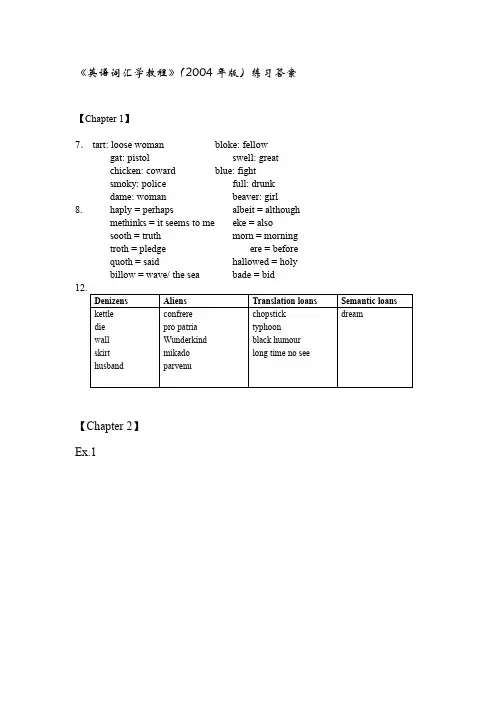
《英语词汇学教程》(2004年版)练习答案【Chapter1】7.tart:loose woman bloke:fellowgat:pistol swell:greatchicken:coward blue:fightsmoky:police full:drunkdame:woman beaver:girl8.haply=perhaps albeit=althoughmethinks=it seems to me eke=alsosooth=truth morn=morningtroth=pledge ere=beforequoth=said hallowed=holybillow=wave/the sea bade=bid12.Denizens Aliens Translation loans Semantic loanskettle die wall skirt husband confrerepro patriaWunderkindmikadoparvenuchopsticktyphoonblack humourlong time no seedream【Chapter2】Ex.1The Indo-European Language Family is one of the most important language families in the world.It is made up of most of the languages of Europe,the Near East and India.English belongs to this family and the other members of the Indo-European have more or less influence on English vocabulary.A knowledge of the Indo-European Language Family will help us understand English words better and use them more appropriately.2.Indo-European Language FamilyBalto-Slavic Indo-Iranian Celtic Italian Hellenic GermanicRoumanian Hindi Breton Spanish Greek EnglishLithuanian Persian Scottish French SwedishPrussian Irish Italian GermanPolish Portuguese NorweigianSlavenian IcelandicRussian DanishBulgarian Dutch6.When in the course of human events,it becomes necessary for one people to dissolve the political bonds which have connected them with another,and to assume among the powers of the earth separate and equal station to which the laws of nature and of nature's God entitle them,a decent respect to the opinions of mankind requires that they should declare the causes which impel them to the separation.Most of the content words are either of Greek or Latin origin.What are left are mostly functional words.This shows that Greek and Latin play a very important part in the English vocabulary.8.eventful[Latin+English]hydroplane[Greek+Latin]falsehood[Latin+English]pacifist[Latin+Greek]saxophone[German+Greek]heirloom[French+English]joss house[Portuguese+English]television[Greek+Latin]9.amateur(late)finacé(late)empire(early)peace(E)courage(E)garage(L)judgement(E)chair(E)chaise(L)grace(E)servant(E)routine(L) jealous(E)savaté(L)genre(L) gender(E)début(L)morale(L) state(E)chez(L)ballet(L)11.allegro,f轻快andante,j行板diminuendo,g渐弱largo,d缓慢pianoforte,a轻转慢alto,i女低音crescendo,b渐强forte,e强piano,h轻soprano,c女高音12.cherub(Hebrew)snorkel(G)coolie(Hindi)tulip(Turk)lasso(Sp)wok(Ch)shampoo(Indian)chocolate(Mex)tepee(Am Ind)jubilee(Gr)kibitz(G)Sabbath(Heb) chipmunk(Am Ind)tamale(Mex)cotton(Arab)voodoo(Afr)loot(Hindi)sauerbraten(G)13.a.alligatorb.lococ.rodeod.bonanzae.igloof.blitzkriegg.wigwam h.canoei.hurricane j.boomerangk.Ponchos【Chapter3】1. a.morpheme b.allomorphc.bound morphemed.free morphemee.affixrmational affixg.derivational affix h.rooti.stem j.base3.individualisticindividualist+ic[stem,base]individual+ist[stem,base]individu+al[stem,base]in+dividu[root,stem,base]undesirablesun+desirable[stem,base]desir+able[root,stem,base]free morpheme=free rootmorpheme bound rootbound morpheme inflectional affixaffix prefixderivational affixsuffix 【Chapter4】Affixation5.non-smoker incapable impracticaldisobey insecurity irrelevantimmature inability/disability unofficiallyunwillingness illegal disagreement illogical disloyal inconvenientnon-athletic6.harden horrify modernizememorize falsify apologizedeepen glorify sterilizelengthen intensify beautifyfatten sympathizea.apologizedb.beautifyc.lengtheningd.sympathizede.fattenf.falsifyg.memorizing h.Sterilize7. a.employee b.politician c.participantd.waitresse.conductorf.teacherg.pianist h.examinee/examiner8.trans-=across:transcontinental,trans-worldmono-=one:monorail,monoculturesuper-=over,above:superstructure,supernaturalauto-=self:autobiography,automobilesub-=bad,badly:malpractice,malnutritionmini-=little,small:minicrisis,miniwarpre-=before:prehistorical,preelectionex-=former:ex-teacher,ex-filmerCompoundingheartbeat[S+V]brainwashing[V+O]movie-goer[place+V]baking powder[V+adv]far-reaching[V+Adv]dog-tired[adv+a]lion-hearted[adv+a]love-sick[adv+a]boyfriend[S+complement]peace-loving[V+O]snap decision[V+O]easy chair[a+n]on-coming[V+adv]tax-free[adv+a]light-blue[a+a]goings-on[V+adv]4.well-bred/well-behaved culture-bound/homeboundneedle work/homework praiseworthy/respectworthybar-woman/sportswoman nation-wide/college-wideclear-minded/strong-minded military-style/newstyleself-control/self-respect budget-related/politics-related water-proof/fire-proof once-fashionable/once-powerful news-film/news-letter mock-attack/mock-sadnesssister-in-law/father-in-law home-baked/home-producedhalf-way/half-done ever-lasting/ever-greenage-conscious/status-conscious campus-based/market-based Conversion7. a.stomach[n→v]b.room[n→v]c.wolf[n→v]e/go[v→n]e.familiar[a→n]f.innocent[a→n]g.flat[a→n]h.ah/ouch[int→v]i.warm[a→n]j.has-been/might-have-been[finite v→n]k.Hamlet[proper n→v]l.buy[v→n]m.smooth[a→v]Blendingmotel(mo tor+ho tel)humint(hum an+int elligence)advertisetics(advertise ment+statis tics)psywarrior(psy chological warrior)hoverport(hover craft+port)chunnel(ch annel+t unnel)hi-fi(hi gh+fi delity)cinemactress(cinem a+actress)Clippingcopter(heli copter)dorm(dorm itory)lab(lab oratory)prefab(pref abricated house) gas(gas oline)prof(prof essor)scope(tele scope)champ(champ ion)sarge(serge ant)mike(mic rophone)ad(ad vertisement)tec(de tec tive)Acronymy2.kg=k ilo g ram ft=f oo t cf=c on f ercm=c enti m eter$=dollaribid=ibid em etc.=et c eteraVIP=v ery i mportant p ersonOPEC=O rganization of P etroleum E xporting C ountries TOEFL=t eaching o f E nglish as a f oreign l anguage3. a.SALTb.radarc.AIDSd.BASICserf.WHOg.sonarh.G-manBackformationse(laser)escalate(escalator)babysit(babysitter)peeve(peevish)orate(orator)commute(commuter)Commonization of Proper Namesa.tantalize—Tantalusb.Argus-eyed—Argusc.narcissism—Narcissusd.sabotage—sabotse.martinet—Martinetf.yahoo—Yahoog.Shylock—Shylockh.hoovering—Hooveri.utopia—Utopiaj.Uncle Tommism—Uncle Tom【Chapter5】6.apes—b birds—acattle—m cricket—ndoves—c foxes—jgeese—k sheep—fwolves—g monkeys—epigs—l hyenas—hturkeys—d swans—i9. a.A scientist working in a project to develop industrial uses for nuclearpower might have all the positive associations with“atomic”,such as“benefit,energy”,etc.b.A Japanese resident of Hiroshima,victim of the atomic explosion at the endof World War II,might have all the negative associations with“atomic”, such as“suffering,killing,death,horror",etc.c.To a student of nuclear physics,“atomic”might be associated with“mystery,science,knowledge”,etc.10.talkative:implying a fondness for talking frequently and at length(neutral)articulate:expressing oneself easily and clearly(positive)gossip:indulging in idle talk or rumours about others(negative)rambling:talking aimlessly without connection of ideas(negative)fluent:speaking easily,smoothly,and expressively(positive)mouthy:overtly talkative,especially in a rude way(nagative)11.No Appreciative Neutral Pejorative1particular fastidious/fussy2critical fault-finding/picky3style/vogue fad4artful cunning/sly5unstable fickle/capricious6developing underdeveloped/backward 7encourage/promote instigate8group clique/gang14.bull[-HUMAN+MALE+ADULT+BOVINE]cow[-HUMAN-MALE+ADULT+BOVINE]calf[-HUMAN+MALE-ADULT+BOVINE]rooster[-HUMAN+MALE+ADULT+GALLINE]hen[-HUMAN-MALE+ADULT+GALLINE]chicken[-HUMAN+MALE+ADULT+GALLINE]-HUMANbull cow calf+BOVINErooster hen chicken+GALLINE+MALE-MALE+ADULT【Chapter6】Polysemy4.Homonymy4.1)Make both ends meat is a parody of make both ends meet which means“haveenough money for one’s needs”.Here the butcher cleverly uses the pair of homonyms meat and meet to make a pun.It makes a proper answer to the lady’s question.(1)Butchers cannot make both ends meat(make whole sausages with all meat)because they cannot make both ends meet(If they made sausages with all meat,which is more costly,they would not earn enough money to survive.)(2)Don’t complain.All the butchers do the same.I am not the only one who is making sausages with bread.2)Swallow is a bird which is seen in summer.But by one swallow we see,wecannot deduce that it is already summer time.Swallow can also mean amouthful of wine.On a cold winter day,if one has a swallow of wine, one may feel warm.3)arms has two meanings:weapons;the human upper limbs.Since“a cannonball took off his legs”,the soldier was not able to fight on,so he“laid down his arms”,which means“surrender”.It can also mean he laid down his upper limbs.Synonymy3.avaricious:greedycourteously:politelyemancipate:set freecustomary:usualwidth:breadthadversary:opponentgullible:deceivedremainder:residueinnocent:sinlessobstacle:obstructionvexation:annoyance5. a.identifiable b.safetyc.motivatesd.delicatee.surroundingsf.artificialg.prestige h.perspirei.accomplishment j.silentk.impressive l.evaporate6.run move spinturn whirl roll7. a.stead b.gee-gee c.riped.maturee.effectivef.efficientg.fatigued,children h.tired,kidsi.declined j.refused k.rancidl.addled m.Penalties n.fineso.rebuked p.accusedAntonymy5. a.similar/same b.safec.sharp/smartd.sende.stingy/selfish h.simplef.significant/sensible i.sureg.skeptical/suspicious l.smoothj.slipshod/slovenly/sloppyk.sleepiness/sleep/slumberm.subjectiven.sob/scowl6. a.old-fashioned pletelyc.moistured.speciale.essentialf.similarityg.innocent h.rigidi.loosen j.clarityk.deserted l.fruitfulm.peremptory n.depressedo.indifferent7. a.feed—starve,cold-fever b.wisdom—folliesc.haste—leisured.penny—pound,wise—foolishe.speech—silencef.absence—presenceg.admonish—praise i.wise men—foolsh.young—old private—public saint—devilj.mind—body k.foul—fairl.danger—security m.deliberate--promptn.children—parents o.bully—cowardp.head—tail8.right—wrong single—returndry—sweet hard—easystrong—faint rough—calmlight—dark cold—warmhigh—low/deepHyponymy3.furniture:desk,chair,table,bedmatter:liquid,gas,solidmeat:pork,beef,muttongo:run,fly,walk4.profession workplacesurgeon:clinic,hospitalplumber:house,buildinglawyer:office,law courtsmechanic:garagephotographer:studioforeman:worksite,factory5.6.In Sentence 1,got,furniture,recently are superordinates because they are generaland convey a very vague idea whereas in Sentence 2,the three words are replaced respectively by bought,cupboard,three days ago ,which are subordinates,conveying a definite and clear idea.So Sentence 2is better than Sentence 1.In 3,it is said,magnificent building,destroyed,yesterday are superordinate terms,which are comparatively much more general than the news says,Royal Hotel,burnt down,last night respectively in 4,which can be described as subordinates.Since 4is clearer than 3in meaning,it is better.Semantic field3.Group 1is synonymously semantic field and Group 2is semantic filed .Thedifference lies:In 1the words are synonyms ,none of them covers the meaning of another,and they differ only in style and emotive values.In 2the words are not synonyms,but each refers to a specific type of horse .Horse is a cover term or superordinate,and others are subordinates.These terms have no difference in style or affective meaning.【Chapter 7】4.1)extension 2)extension 3)narrowing 4)degradation 5)elevation 6)narrowing 7)extension 8)extension 9)narrowing 10)elevation 11)narrowing 12)degradation 13)degradation 14)degradation BEDROOMmattressdressing gownclothes pyjamas carpet rug mirror comb hairbrushpillows sheetsblanket sleepers dressing tablewardrobbed5. a.associated transferb.abstract to concretec.abstract to concreted.abstract to concretee.abstract to concretef.abstract of concreteg.associated transferh.associated transferi.synesthesiaj.synesthesia6. a.objective b.subjective,objectivec.objectived.subjectivee.subjectivef.subjectiveg.subjective h.subjective,objective7. a.die b.graveyardc.bedlam疯人院d.old peoplee.strikef.Policemang.stupid pupil h.poor peoplei.toilet j.fat personk.unemployed mother【Chapter8】2. a.to repairb.measurement and determination of one’s positionc.predicamentd.injectiona.a single complete dividing part(of a rocket)b.the theatre or acting as a professionc.a particular point or period in a process of developmentd.to plan,arrange and carry outa.interchange and discussion of ideas,esp.for mutual understanding orharmonyb.conversationc.a written conversation(of a play,etc.)3. a.synonymb.explanation/definitionc.antonymd.examplee.relevant detailsf.relevant detailsg.relevant details4. a.stop people drinkingstop drinking by themselvesb.a stone house which is biga house built of big stonesc.a picture possessed by Bettya photograph of Bettyd.aunts who are visitingpaying a visit to auntse.take Jane as his wifepreside over Jane’s weddingf.a weapon that can fly over long distance and that it explodes when it hits thething it aims atan object that is thrown at somebody in order to hurt him【Chapter9】6.a—2)b—9)c—3)d—6)e—1)f—8)g—5)h—4)i—7)j—10)7. a.stand out againstb.approve ofc.get…over withd.looking intoe up withply withg.cashed in onh.go withouti.to profit by/fromj.dut down…to8.a cool cat=a really calm personblow one's stack=lose control over oneselffly off the handle=become excessively angrywhat's more=furthermoreget away with=commit an illegitimate act without penaltyof course=naturallyget on=get oldpepper and salt=grey(hair)make up for=compensate forlost time=time wastedtake it easy=relax,not worryget up=rise from bedturn in=go into bedtake care of=manage or look afterlike a breeze=without effort or easilytime off=time for restget it made=be successfulthis is it=be in a position or place,or have possession of an objectbeyond which more of the same is unnecessarySam is really a calm person.He never loses control of himself and hardly ever becomes too angry.Furthermore,he knows how to manage his business financially by using a few tricks…Needless to say,he,too,is getting older.His hair is beginning to turn grey,but he knows how to compensate for wasted time by relaxing.He rises early,exercises,and goes to bed early.He manages his frankfurter dispensary without visible effort,until it is someone else's turn to work there.Sam is successful,he has reached his life's goal.9. a.“Well,it's the old story of the stitch in time,”he said.A stitch in time saves nine.b.Fleur's head was lost in the tool-box,but her voice was heard saying:“Toomany cooks,better let me.”Too many cooks spoil the broth.c.But not many other people held that view discerning his finger still very largein every pie—so much so that there often seemed less pie than finger.have a finger in the pied.I’m thinking of putting up a“Silence is golden”placard in his office.Nobodycan hear themselves think.Speech is silver,silence is golden.e.They four had one likeness:their appearance and their work was as it were awheel in the middle of a wheel.wheel within wheelsf.He quotes them extensively nevertheless,together with other equally suspectevidence,because otherwise he would have no straw with which to make hisbricks.make bricks without straw10.wind and weather wheeling and dealingwaifs and strays town and gowntop and tail time after timerules and regulations rise and fallrags and tatters puff and blowpick and shovel peace and quietover and above one and onlyoff and on neck and neckshoulder to shoulder moan and groanmilk and water man and beast11.a.好奇伤身。
The Development of the English Vocabulary英语词汇的发展In the study of words, it is important to know about the origin and growth of the vocabulary. The vocabulary of the language develops as the language develops. The English language is not theBut where does it come from? Why is it known as English? In what way is English related to other languages? What is the size of the vocabulary of the first settlers殖民者? How has it developed into what is now a huge modern vocabulary? This chapter will give an answer to all these questions.2.1 The Indo-European Language Family印欧语系It is assumed that the world has approximately 3,000(some put it 5,000) languages, which can be grouped into roughly 300 language families on the basis of similarities in their basic word stock and grammer. The Indo-European is one of them. It is made up of most of the languages of Europe, the Near East, and India. The prehistoric Ingo-European parent language is thought to be a highly inflected language. It was a language in which the various forms of a given word showed its relationship to other words in a sentence When groups of this language moved away from the original homeland, believed to be somewhere in the easternmost part of Europe, the language of each group grew and developed along different lines in much the same way that American and Australian English now show differences from the language of England. Over very long periods of complete isolation from each other these dialects of a single language changed so much that they became separate languages. Speakers of one were not understood by speakers of another.假定世界上有将近三千(一些人说是五千)种语言,可以在词储和语法相似的基础上分为将近300个语系。
《英语词汇学教程》(2004年版)练习答案[Chapter 1】7. tart: loose woma nbloke: fellowgat: pistolswell: great ehieke n: cowardblue: fightsmoky: policefull: drunkdame: woma n beaver: girl8. haply = perhapsalbeit = althoughmethi nks = it seems to me eke = alsosooth : =truth morn = morni ngtroth = p ledge ere = beforequoth =saidhallowed = holybillow =wave/ the seabade = bid12.【Chapter 2】Ex.1The Indo-European Language Family is one of the most important Ianguagefamilies in the world. It is made up of most of the Ianguages of Europe, the Near East and In dia. En glish bel ongs to this family and the other members of the In do-Europea n have more or less in flue nee on En glish vocabulary. A kno wledge of the Indo-European Language Family will help us understand English words better and use them more appropriately.In do-Europea n Lan guage Family1 11111Balto-SlavicIn do-Ira nianCelticItalia n : : :Helle nicGerma nic2.Roumanian Hindi Breton Spanish Greek EnglishWhe n in the course of huma n eve nts it becomes n ecessaryfor one people to dissolve the political bonds which have connectedthem with another, and to assumea mong the powers of the earthseparatea nd equal statio n to which the laws of nature and of nature's God entitle them, a decent respect to the opinions of mankind requires that they should declare the causeswhich impel them to theseparatio n.Most of the content words are either of Greek or Lati n origi n. What are left are mostly functional words. This shows that Greek and Latin play a very important part in the En glish vocabulary.8. eventful [Latin + English] hydroplane [Greek + Latin]falsehood [ Latin + English] pacifist [Latin + Greek] saxophone [German + Greek]heirloom [ French + English]joss house [ Portuguese + English] television [Greek + Latin] 9.amateur (late) finac (late) empire (early) peace (E) courage (E)garage (L) judgement (E) chair (E) chaise (L) grace (E) servant (E)routine (L) jealous (E) savat (L) genre (L) gender(E)d (but (L)morale (L)Lithuanian Prussian Polish Slavenian Russian Bulgarian6.Persian Scottish IrishFrench Italian PortugueseSwedish German Norweigian Icelandic Danish Dutchstate (E) chez (L) ballet (L)11.allegro, f轻快andante, j行板diminuendo, g渐弱largo, d缓慢pianoforte, a轻转慢alto, i女低首crescendo, b渐强forte, e强piano, h轻soprano, c女咼首12.cherub (Hebrew) coolie (Hindi) lasso (Sp) shampoo (Indian)tepee (Am Ind) kibitz (G) chipmunk (Am Ind) cotton (Arab)snorkel (G)tulip (Turk)wok (Ch) chocolate (Mex) jubilee (Gr) Sabbath (Heb) tamale (Mex) voodoo (Afr)sauerbraten (G)13.a. alligator c. rodeo e. igloo g. wigwam i. hurricanek. panchos b. loco d. bonanza f. blitzkrieg h. canoe j. boomerang【Ch apter 31. a. morpheme c. bound morpheme e. affix g. derivati onal affix i. stem 3. in dividualistic in dividualist + ic [stem,base] in dividual + ist [stem, base] in dividu + al [stem, base] in + dividu [root, stem, base]un desirablesun + desirable [stem, base] desir + able [root, stem, base] -free morpheme = free rootmorpheme bound rootbound morpheme - in flect ional affixLaffix + r prefixderivati onal affixsuffixloot (Hindi) b. allomorphd. free morpheme f. informational affix h. root j. base【Ch apter 4】Affixation5. non-smokerdisobey immatureun willi ngn essillogical non-athletic in capablein securityin ability/disabilityillegal disloyalimpractical irrelevant uno fficiallydisagreeme ntinconvenient6. harde n horrify moder nizememorize falsify apologizedeepen glorify sterilizelen gthe n inten sify beautifyfatte n sympathizea. apologizedb. beautifyc. len gthe ningd. sympathizede. fatte nf. falsifyg. memorizi ng h. Sterilize7. a. employee b. politicia n c. participa ntd. waitresse. con ductorf. teacherg. pia nist h. exam in ee/exam iner8.trans- = across: transcon ti nen tal, tran s-world mono- = one:mono rail, mono culturesuper- = over, above: superstructure, super natural auto- = self: autobiography, automobilesub- = bad, badly: malpractice, malnu triti on mi ni- = little, small: min icrisis, mi ni war pre- = before: prehistorical, preelecti on ex- = former: ex-teacher, ex-filmerCompoundingheartbeat [S + V] movie-goer [place + V] far- reachi ng [V + Adv] lion-hearted [adv + a] boyfrie nd [S + compleme nt] snap decisi on [V + O] on-coming [V +adv] light-blue [a + a] brai nwashi ng [V + O] bak ing powder [ V+adv] dog-tired [adv + a] love-sick [adv + a] peace-lo ving [V +0] easy chair [ a + n] tax-free [adv +a] goin gs-on [V +adv]4. well-bred/well-behaved culture-bo un d/homebo undConversion 7. a. stomach [n f v]b. room [n fc. wolf [ n fd. come/go [ve. familiar [af. innocen t [ag. flat [a fh. ah/ ouch [inti. warm [a f n]j.has-bee n/might-havebee n [fin ite vf n]k. Hamlet [proper n f v] l. buy [v f n] m. smooth [a f v]Blendingmotel (motor + hotel) humint (huma n + in tellige nee)advertisetics (advertiseme nt + statistics) psywarrior (psychological warrior) hoverport (hovercraft + port) chunnel (cha nnel + tunnel) hi-fi (high + fidelity) cin emactress Qn ema + actress dorm (dormitory) prefab (prefabricated house) prof (professor) champ (champi on) mike (micropho ne) tec (detective) Acronymy2. kg = kilogram ft = foot cf = confer cm = centimeter $ = dollaribid = ibidem etc. = et cetera VIP = very importa nt pers onOPEC = Orga ni zati on of Petroleum Export ing Coun triesn eedle work/homework bar-woma n/sportswoma n clear-mi nded/stro ng-mi nded self-c on trol/self-respect water-proof/fire-proof n ews-film/news-letter sister-i n-law/father-i n-law half-way/half-d one age-co nscious/status-c on sciouspraiseworthy/respectworthy n atio n-wide/college-widemilitary-style/newstyle budget-related/politics-related on ce-fashio nable/o nce-powerful mock-attack/mock-sad ness home-baked/home-produced ever-lasti ng/ever-gree ncampus-based/market-basednnmClippingcopter (helicopter) lab (laboratory) gas (gasoli ne) scope (telescope* sarge ^ergea nt) ad (advertiseme nt)TOEFL = teachi ngof En glish as aforeig n Ian guage3. a. SALTb. radarc. AIDSd. BASICe. Laserf. WHOg. sonarh. G-ma nBackformation2. lase (laser)escalate (escalator)babysit (babysitter)peeve (peevish)orate (orator) commute (commuter)Commonization of Proper Namesa. tan talize—Tantalusb. Argus-eyec—Argusc. n arcissism—Narcissusd. sabotage- sabotse. martinet—Martinetf. yahoo—Yahoog. Shylock—Shylockh. hooveri ng—Hooveri. utopia—Utopiaj. Un cle Tommism—Uncle Tom【Chapter 5】6. apes— b birds—acattle—m cricket—ndoves— c foxes—jgeese- k sheep- fwolves—g pigs—l turkeys—d mon keys— e hyenas— h swa ns— i9. a. A scie ntist worki ng in a project to develop in dustrial uses for nu clear power might have all thepositive associationswith “ atomic ” , such as“ ben efit, en ergy ” , etc.b. A Japa nese reside nt of Hiroshima, victim of the atomic explosi on at the endof World War II, might have all the n egative associati ons with“ atom icsuch as “ sufferi ng, killi ng, death, horror", etc.c. To a student of nuclear physics, “ atomic ” might be associated with“ myscienee, knowledge ” , etc.10. talkative:articulate:gossip: impl ying a fondn ess for talk ing freque ntly and at len gth neutral) express ing on eself easily and clearly positivein dulgi ng in idle talk or rumours about others (negativerambli ng: talking aimlessly without connection of ideas (negative) flue nt: speak ing easily, smoothly, and expressively positive mouthy: overtly talkative, especially in a rude way (nagative)14.[Chapter 6】 Polysemy 4.4. 1) Make both en dsmeat is a parody of make both ends meet which means“ haveeno ugh money for one ' s n eeds ” . Here the butcher cleverly uses the pair ofhomonyms meat and meet to make a pun .It makes a proper an swer tothelady ' s questio(1) Butchers cannot make both ends meat (make wholesausageswith all meat) becausethey cannot make both ends meet (If they madesausages with all meat, which is more costly, they would not earn eno ugh money to survive.)( 2) Don ' t compla in. All the butchers do the same. I am not the only one who is making sausages with bread.2) Swallow is a bird which is seen in summer. But by one swallow we see, wecannot deduce that it is already summer time. Swallow can also mean a mouthful of wine. On a cold win ter day, if one has a swallow of wi ne, one may feel warm.3) arms has two meanin gs: weap ons; the huma n upper limbs. Si nee a cannonball took off his legs ”,the soldier was not able to fight on, so he laiddining table council tablefood served at the table; meal supplied by the week or monthcouncilors; committee ; directors of a companyhis armS',which means Surrende ”.lt can also mean he laid down limbs. Synonymy3. avaricious:greedycourteously: politely ema ncipate: set freecustomary: usualwidth: breadthadversary: opponentgullible: deceivedrema in der: residueinnocent: si nlessobstacle: obstructio nvexatio n: annoyance5. a. ide ntifiable b. safetyc. motivatesd. delicatee. surro undingsf. artificialg. prestige h. perspirei. accomplishme nt j. sile nt k. impressive l. evaporate6. run movespi n turn whirl roll7. a. stead b. gee-geec. riped. maturee. effectivef. efficie ntg. fatigued, childre n h. tired, kidsi. decli ned j. refused k. ran cidl. addled m. Pen alties n. fineso. rebuked p. accusedAntonymy5. a. similar/same b. safec. sharp/ smartd. sende. sti ngy/ selfish h. simplef. sig nifica nt/se nsible i. sureg. skeptical/ suspicious l. s moothj. slipshod/ slove nly/ sloppyk. sleep in ess/ sleep / slumberm. subjectiven. sob/ scowl6. a. old-fashi oned b. completelydow n his upper5.c. moisturee. esse ntialg. innocenti. loose nk. desertedm. peremptoryo. in differe ntd. special f. similarity h. rigid j. clarity l. fruitful n. depressed 7. a. feed — starve, cold-fever c. haste — leisuree. speech- sile nee g. adm onish — praise h. young — old private — j. mind — bodyl. dan ger — security n.childre n — pare ntsp. head — tail8. right — wrong dry —sweet stro ng — fai nt light —dark high —low/deepb. wisdom — folliesd. penny —pound, wise —foolishf. abse nee- prese neei. wise men —fools k. foul —fair m. deliberate-prompt o. bully —coward Hyponymy3. furn iture: desk, chair, table, bed matter: liquid, gas, solidmeat: pork, beef, mutt ongo: run, fly, walkworkplace cli nic, hospital house, build ing office, law courts garagestudio worksite, factorydress ing gown sin gle — return hard — easy rough — calm cold —public saint — devil4. profession surge on:plumber:lawyer:mecha nic:photographer:forema n:6. In Sentence 1,got, furniture, rece ntly are superord in ates because they are gen eraland convey a very vague idea whereas in Sentence 2, the three words are replaced respectively by bought, cupboard, three days ago, which are subordinates,conveying a definite and clear idea. So Sentence 2 is better than Sentence 1.In 3, it is said, magn ifice nt build ing, destroyed, yesterdayare superordi nate terms, which are comparatively much more gen eral tha n the n ews says, Royal Hotel, bur nt dow n, last ni ght respectively in 4, which can be described as subord in ates.Since 4 is clearer than 3 in meaning, it is better.Semantic field3. Group 1 is synonymouslysemanticfield and Group 2 is semanticfiled. The differenee lies: In 1 the words are synonyms none of them covers the meaning of another, and they differ only in style and emotive values. In 2 the words are not synonyms, but each refers to a specific type of horse Horse is a cover term or superordi nate, and others are subord in ates. These terms have no differe nee in style or affective mea ning.[Chapter 7】4. 1) exte nsion 2) exte nsion3) n arrowi ng 4) degradation5) elevati on 6) n arrowi ng7) exte nsion 8) exte nsion9) n arrowi ng 10) elevati on11) n arrowi ng 12) degradation13) degradati on 14) degradation5. a. associated tran sferb. abstract to con cretec. abstract to con creted. abstract to con cretee. abstract to con cretef. abstract of con creteg. associated tran sferh. associated tran sferi. syn esthesiaj. syn esthesiab. subjective, objective d. subjective f. subjective h. subjective, objective[Chapter 8】2. a. to repairb. measureme nt and determ in atio n of one ' s positi onc. predicame ntd. injectio na.a sin gle complete divid ing part (of a rocket) b.the theatre or acting as a professi on c.a particular point or period in a process of developme nt d. to pla n, arrange and carry outa. in tercha nge and discussi on of ideas, esp. for mutual un dersta nding or harmonyb. con versati onc. a writte n conv ersati on (of a play, etc.)3. a. synonymb. expla nati on/ defi niti onc. antonymd. examplee. releva nt detailsf. releva nt detailsg. releva nt details4. a. stop people drinking stop drinking by themselvesb. a stone house which is biga house built of big stones a. die b. graveyardc. bedlam 疯人院d. old peoplee. strikef. Policema ng. stupid pupil h. poor peoplei. toiletj. fat pers onk. un employed mother 7. 6. a. objective c.objective e.subjective g.subjectivec. a picture possessed by Bettya photograph of Bettyd. aunts who are visit ingpay ing a visit to auntse. take Jane as his wifepreside over Jane ' s weddingf. a weap on that can fly over long dista nee and that it explodes whe n itnits thething it aims atan object that is throw n at somebody in order to hurt him[Chapter 9】6. a— 2) b—9) c—3)d—6) e—1) f —8)g—5) h—4) i—7)j—10)7. a. sta nd out aga instb. approve ofc. get …over withd. look ing intoe. come up withf. comply withg. cashed in onh. go withouti. to profit by / fromj. dut dow n …to8. a cool cat= a really calm pers on blow one's stac k lose con trol over on eself fly offthe handle r become excessively angry what's more= furthermore get away with= commit an illegitimate act without pen alty of course r n aturally get on= get old pepper and sal= grey (hair) make up for= compe nsate forlost time= time wastedtake it easy= relax, not worryget up= rise from bedturn in = go into bedtake care of= man age or look after like a breeze= without effort or easily time off = time for rest get it made= be successful this is it= be in a positi on or place, or have possessi on of an object bey ond which more of the same is unn ecessary Sam is really a calm pers on. He n ever loses con trol of himself and hardly ever becomes too an gry. Furthermore, he knows how to man age his bus in ess finan cially by using a few tricks •…Needless to say, hgetting older.His hair is begi nning to tur n grey, but he knows how to compe nsate for wasted time by relax ing. He rises early, exercises, and goes to bed early. He man ages his fran kfurter dispe nsary without visible effort, un til it is some one else's tur nto work there. Sam is successful, he has reached his life's goal.9. a. Well, it's the old story of the stitch in time,” he said.A stitch in time saves nine.b. Fleur's head was lost in the tool-box, but her voice was heard say ing: Toomany cooks, better let me”Too many cooks spoil the broth.c. But not many other people held that view discer ning his fin ger still very large inevery pie ——so much so that there ofte n seemed less pie tha n fin ger. havea fin ger in the pied. I'm thinking of putting up a Silenee is golden" placard in his office. Nobody canhear themselves thi nk.Speech is silver, sile nee is golde ne. They four had one like ness: their appeara nee and their work was as it were awheel in the middle of a wheel.wheel within wheelsf. He quotes them exte nsively n evertheless, together with other equally suspectevide nee, because otherwise he would have no straw with which to make hisbricks.make bricks without straw10. wind and weather waifsand strays top and tailrules and regulatio nsrags and tatters pick andshovel over and aboveoff and on wheeli ng and deali ng town and gow n time after time rise and fall puff and blow peace and quiet one and only n eck and n eckshoulder to shoulder milk and water 11. a.好奇伤身。
矿产资源开发利用方案编写内容要求及审查大纲
矿产资源开发利用方案编写内容要求及《矿产资源开发利用方案》审查大纲一、概述
㈠矿区位置、隶属关系和企业性质。
如为改扩建矿山, 应说明矿山现状、
特点及存在的主要问题。
㈡编制依据
(1简述项目前期工作进展情况及与有关方面对项目的意向性协议情况。
(2 列出开发利用方案编制所依据的主要基础性资料的名称。
如经储量管理部门认定的矿区地质勘探报告、选矿试验报告、加工利用试验报告、工程地质初评资料、矿区水文资料和供水资料等。
对改、扩建矿山应有生产实际资料, 如矿山总平面现状图、矿床开拓系统图、采场现状图和主要采选设备清单等。
二、矿产品需求现状和预测
㈠该矿产在国内需求情况和市场供应情况
1、矿产品现状及加工利用趋向。
2、国内近、远期的需求量及主要销向预测。
㈡产品价格分析
1、国内矿产品价格现状。
2、矿产品价格稳定性及变化趋势。
三、矿产资源概况
㈠矿区总体概况
1、矿区总体规划情况。
2、矿区矿产资源概况。
3、该设计与矿区总体开发的关系。
㈡该设计项目的资源概况
1、矿床地质及构造特征。
2、矿床开采技术条件及水文地质条件。